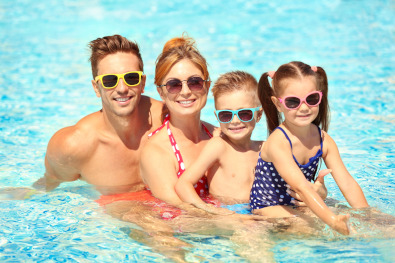Shop great deals on our online store! Shop now
Our Resources
Swimming Pool Safety Tips for Children
November 15/2024
Swimming pools are a great source of enjoyment and relaxation, especially during the summer months. However, it's crucial to prioritize safety, particularly when it comes to children. In this blog post, we will discuss essential swimming pool safety tips to ensure that children can have a fun and safe swimming experience.

Active Supervision:
Never leave children unattended near a swimming pool, regardless of their swimming ability. Designate a responsible adult as the designated "water watcher" whose sole responsibility is to supervise the pool area actively. Avoid distractions such as phones or reading materials, and maintain constant visual contact with children in and around the water.
Learn to Swim:
Enroll children in swimming lessons as early as possible. Formal swimming lessons can teach them vital water safety skills, including floating, treading water, and basic swimming strokes. However, even with lessons, constant supervision is still necessary, especially for younger or inexperienced swimmers.
Establish Pool Rules:
Clearly communicate and enforce a set of pool rules for children to follow. Emphasize the importance of no running, no diving in shallow water, and no pushing or horseplay. Ensure that children understand and respect these rules to minimize the risk of accidents or injuries.
Install Safety Barriers:
Create physical barriers around the pool area to prevent unauthorized access by children. Install a secure fence with self-closing and self-latching gates. The fence should be at least four feet high and have no footholds that would allow children to climb over. Consider using door alarms or pool covers as additional safety measures.
Use Coast Guard-Approved Life Jackets:
For non-swimmers or children who are still developing their swimming skills, always ensure they wear a properly fitted U.S. Coast Guard-approved life jacket when in or around the pool. Inflatable toys or arm floaties are not a substitute for a life jacket and should not be relied upon for safety.
Teach Water Safety Rules:
Educate children about water safety guidelines, such as not swimming alone, not swimming during inclement weather, and not diving in unfamiliar areas. Teach them to be aware of pool drains and to stay away from them, as they can pose entrapment hazards.
Learn CPR and First Aid:
Parents, caregivers, and other adults supervising pool activities should learn cardiopulmonary resuscitation (CPR) and basic first aid techniques. In case of emergencies, being trained in these skills can make a significant difference in providing immediate care until professional help arrives.
Pool Toys and Floatation Devices:
While pool toys and floatation devices can add fun to pool time, they should be used with caution. Avoid excessive reliance on floatation devices, as they can give a false sense of security. Ensure that toys and inflatable devices are age-appropriate and do not pose any safety risks.
Conclusion:
Swimming pools offer wonderful opportunities for children to have fun and stay active, but safety should always be the top priority. By following these essential swimming pool safety tips, such as active supervision, learning to swim, establishing pool rules, installing safety barriers, using life jackets, teaching water safety, and being prepared with CPR and first aid knowledge, you can create a safe environment for children to enjoy their pool experiences to the fullest. Let's make this summer a season of joyful memories while keeping our children safe!
More online client services than any other Pool/Spa Dealer
Discover Now
We make backyard dreams come true in Virgina Beach, VA! Providing high quality products and service at competitive prices is our mission. We are the leaders in the swimming Pool and Hot tub industry, offering everything from installation to service. We offer a wide variety of hot tub chemicals and accessories, pool pumps, filters, heaters, cleaners, liners, covers and much more. Come visit our showroom and see why we rock.
155 S. Rosemont Road
Virginia Beach, VA 23452
(757) 490-7727 Local
(888) 313-7727 Toll Free
(757) 490-2292 Fax
Virginia Beach, VA 23452
(757) 490-7727 Local
(888) 313-7727 Toll Free
(757) 490-2292 Fax
Monday - Saturday 10am - 6pm
Sunday Closed
Sunday Closed
Copyright © Innovative & Spas. All rights reserved.
Privacy Policy |
Terms and Conditions |
Sitemap
Powered by Forinsite Insuite Suite for Pool/Spa Dealers
Powered by Forinsite Insuite Suite for Pool/Spa Dealers


